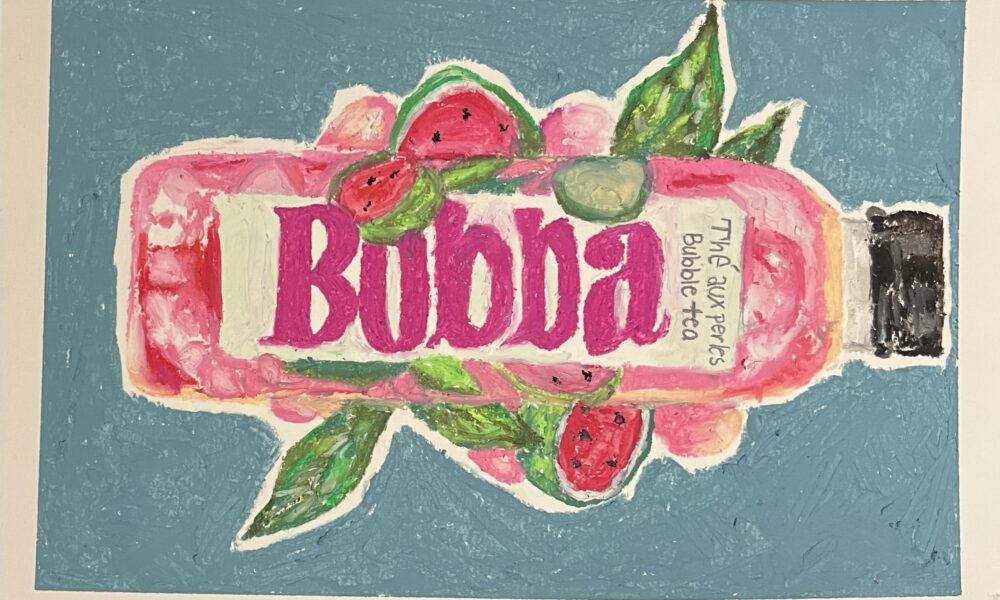Little in this world entertains and aggravates me as much as Dragons’ Den. Now on its 19th season, this hit CBC show sees aspiring entrepreneurs pitch ideas to a panel of potential investors that range in quality from inspired to downright idiotic: Bottled Intentions, a company selling bottled water with embossed words of affirmation along the side to promote positive thinking, is a particularly memorable flop. Though the show was a staple of my childhood, Dragons’ Den had completely disappeared from my consciousness until just a few weeks ago.
On an episode that aired Oct. 10, acclaimed actor Simu Liu joined the show as a Guest Dragon in hopes of finding Asian American and Pacific Islander (AAPI)-led small businesses to back with his newly-founded venture capital firm, Markham Valley Ventures. Instead, Liu found himself amidst controversy for voicing his concerns about Québecois entrepreneurs Sébastien Fiset and Jess Frenette’s company Bobba, a purveyor of bottled bubble tea.
Describing bubble tea as a “trendy, sugary drink” with ingredients that buyers can “never be quite sure about,” Fiset and Frenette pitched Bobba as a healthy solution. After mild pushback from Liu, who expressed dismay that their products lacked appropriate recognition of the drink’s Taiwanese origins, the founders claimed that Bobba was no longer an ethnic product thanks to the addition of “crazy innovations” like popping bubbles to their recipes.
Fiset later clarified that, despite the complete absence of references to the drink’s cultural roots on the can or in the marketing materials, the product’s cultural aspects came from the company’s collaborations with a Taiwanese supplier to develop its boba recipes and pearls.
This microaggression-laden pitch is a clear-cut example of cultural appropriation: Two white individuals profiting off of a cultural product and taking credit for so-called innovations while rendering its distinctly Asian roots invisible. Boba first originated in Taiwan’s tea shops in the 1980s, but it has since spread to many other Asian countries and diasporic communities worldwide, becoming an important cultural symbol in the process. Ignoring the drink’s cultural significance while profiting off its popularity is straightforward exploitation, and the founders’ insinuation that traditional boba recipes are deceptive and mysterious is incredibly insulting to Asian communities that have been making this drink for decades. Furthermore, these concerns are completely fabricated; traditional bubble tea recipes call for a simple combination of tapioca pearls, brown sugar, milk, and black tea, while fruit tea variants can be made using fresh fruits and simple syrups.
Yet perhaps just as concerning as this misguided pitch was the speed and fervour with which fellow Dragon Manjit Minhas jumped to its defence. The Indian-Canadian venture capitalist repeatedly spoke over Liu and rebuked him for overreacting, insisting that there is nothing wrong with giving traditional cultural products a new spin. Minhas then proceeded to make an investment offer the Bobba founders swiftly accepted.
As one of two other people of colour and the only South Asian Dragon, it is especially disappointing to see Minhas show no solidarity with Liu’s perspective. Instead, Minhas’ implicit message—that those who speak out against cultural appropriation are overly sensitive and raising an unnecessary fuss—only emboldened the other Dragons to ignore Liu’s concerns themselves.
Following public backlash to the episode, Minhas took to Instagram to confirm that she had pulled her offer after further reflection. While many were happy to see her withdrawing financial support for the company, the post lacked any remorse for her behaviour towards Liu or acknowledgement of the pitch’s shortcomings. Rather, she subtly doubled down on her denial of cultural appropriation, insisting that sharing traditional foods and goods is just an essential part of connecting with others.
In our increasingly globalized world, cross-cultural exchange is inevitable, and that is by no means inherently bad. However, there is a marked difference between giving a cultural product you appreciate a new twist and divorcing it from its cultural origins completely. As consumers, we must recognize the difference between cultural appreciation and appropriation. We must stand in solidarity with those like Liu who call out the minds behind exploitative companies like Bobba for what they are: Uninformed businesspeople looking to make a quick buck off of another group’s heritage.





